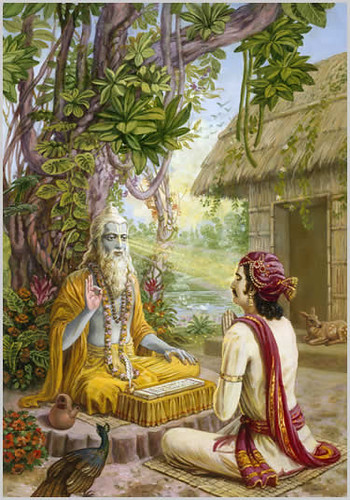Vidura said: O great sage, everyone in this world engages in fruitive activities to attain happiness, but one finds neither satiation nor the mitigation of distress. On the contrary, one is only aggravated by such activities. Please, therefore, give us directions on how one should live for real happiness.
3.5.4: Therefore, O great sage, please give me instruction on the transcendental devotional service of the Lord, so that He who is situated in the heart of everyone can be pleased to impart, from within, knowledge of the Absolute Truth in terms of the ancient Vedic principles delivered only to those who are purified by the process of devotional service.
3.5.13: For one who is anxious to engage constantly in hearing such topics, kṛṣṇa-kathā gradually increases his indifference towards all other things. Such constant remembrance of the lotus feet of Lord Kṛṣṇa by the devotee who has achieved transcendental bliss vanquishes all his miseries without delay.
These verses are similar in mood to Sri Prahalada Maharaja Prayers to Lord Narasimha Deva:
SB 7.9.17 — O great one, O Supreme Lord, because of combination with pleasing and displeasing circumstances and because of separation from them, one is placed in a most regrettable position, within heavenly or hellish planets, as if burning in a fire of lamentation. Although there are many remedies by which to get out of miserable life, any such remedies in the material world are more miserable than the miseries themselves. Therefore I think that the only remedy is to engage in Your service. Kindly instruct me in such service.
SB 7.9.18 — O my Lord Nṛsiṁhadeva, by engaging in Your transcendental loving service in the association of devotees who are liberated souls [haṁsas], I shall become completely uncontaminated by the association of the three modes of material nature and be able to chant the glories of Your Lordship, who are so dear to me. I shall chant Your glories, following exactly in the footsteps of Lord Brahmā and his disciplic succession. In this way I shall undoubtedly be able to cross the ocean of nescience.
SB 7.9.19 — My Lord Nṛsiṁhadeva, O Supreme, because of a bodily conception of life, embodied souls neglected and not cared for by You cannot do anything for their betterment. Whatever remedies they accept, although perhaps temporarily beneficial, are certainly impermanent. For example, a father and mother cannot protect their child, a physician and medicine cannot relieve a suffering patient, and a boat on the ocean cannot protect a drowning man.
SB 7.9.20 — My dear Lord, everyone in this material world is under the modes of material nature, being influenced by goodness, passion and ignorance. Everyone — from the greatest personality, Lord Brahmā, down to the small ant — works under the influence of these modes. Therefore everyone in this material world is influenced by Your energy. The cause for which they work, the place where they work, the time when they work, the matter due to which they work, the goal of life they have considered final, and the process for obtaining this goal — all are nothing but manifestations of Your energy. Indeed, since the energy and energetic are identical, all of them are but manifestations of You.
SB 7.9.21 — O Lord, O supreme eternal, by expanding Your plenary portion You have created the subtle bodies of the living entities through the agency of Your external energy, which is agitated by time. Thus the mind entraps the living entity in unlimited varieties of desires to be fulfilled by the Vedic directions of karma-kāṇḍa [fruitive activity] and the sixteen elements. Who can get free from this entanglement unless he takes shelter at Your lotus feet?


